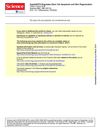 81 citations,
October 2014 in “The journal of investigative dermatology/Journal of investigative dermatology”
81 citations,
October 2014 in “The journal of investigative dermatology/Journal of investigative dermatology” Certain genes control the color of human hair by affecting pigment production.
 81 citations,
June 2014 in “Cold Spring Harbor perspectives in medicine”
81 citations,
June 2014 in “Cold Spring Harbor perspectives in medicine” Skin has specialized touch receptors that can tell different sensations apart.
 81 citations,
November 2012 in “Journal of the National Cancer Institute”
81 citations,
November 2012 in “Journal of the National Cancer Institute” The tumor suppressor gene FLCN affects mitochondrial function and energy use in cells.
 81 citations,
July 2012 in “Translational Psychiatry”
81 citations,
July 2012 in “Translational Psychiatry” Memantine may slightly improve memory in people with Down syndrome, but more research is needed.
 81 citations,
April 2009 in “Journal of Investigative Dermatology”
81 citations,
April 2009 in “Journal of Investigative Dermatology” Hair shedding is an active process that could be targeted to treat hair loss.
 81 citations,
January 2006 in “Journal of cellular physiology”
81 citations,
January 2006 in “Journal of cellular physiology” Mice without the vitamin D receptor gene lose hair due to disrupted hair follicle cycles.
 81 citations,
September 2005 in “The American journal of pathology”
81 citations,
September 2005 in “The American journal of pathology” Activin helps skin growth and healing mainly through stromal cells and affects keratinocytes based on its amount.
 80 citations,
May 2011 in “Nature Cell Biology”
80 citations,
May 2011 in “Nature Cell Biology” New methods have greatly improved our understanding of stem cell behavior and roles in the body.
 80 citations,
April 2011 in “Plant physiology”
80 citations,
April 2011 in “Plant physiology” White lupin uses specific genes to grow root hairs and access phosphorus when it's scarce.
 80 citations,
June 2008 in “Biomaterials”
80 citations,
June 2008 in “Biomaterials” EVAL membranes help create cell structures that can regrow hair follicles.
 79 citations,
January 2015 in “Journal of Materials Chemistry B”
79 citations,
January 2015 in “Journal of Materials Chemistry B” Smart biomaterials that guide tissue repair are key for future medical treatments.
 78 citations,
June 2013 in “Science”
78 citations,
June 2013 in “Science” Mice without the Sept4/ARTS gene heal wounds better due to more stem cells that don't die easily.
 78 citations,
February 2011 in “Canadian Medical Association Journal”
78 citations,
February 2011 in “Canadian Medical Association Journal” Acne treatment varies, with topical and systemic therapies effective, and more research needed on treatment order and long-term effects.
 78 citations,
September 2008 in “International Journal of Cosmetic Science”
78 citations,
September 2008 in “International Journal of Cosmetic Science” The document concludes that various clinical methods are used to assess ageing skin and the effectiveness of anti-ageing products.
 78 citations,
September 2006 in “International Journal of Cosmetic Science”
78 citations,
September 2006 in “International Journal of Cosmetic Science” Dandruff is mainly caused by a scalp reaction to yeast, can worsen hair loss, and antifungal treatments may help.
 78 citations,
August 2002 in “Experimental Dermatology”
78 citations,
August 2002 in “Experimental Dermatology” Researchers developed a quick and easy way to get and grow cells from the base of human hair follicles.
 78 citations,
March 1987 in “Journal of The American Academy of Dermatology”
78 citations,
March 1987 in “Journal of The American Academy of Dermatology” Minoxidil promotes hair growth but stops working when discontinued.
 77 citations,
March 2021 in “Nature”
77 citations,
March 2021 in “Nature” Stress hormone corticosterone blocks a growth factor to slow down hair stem cell activity and hair growth.
 77 citations,
July 2020 in “Cell”
77 citations,
July 2020 in “Cell” Muscles and nerves that cause goosebumps also help control hair growth.
 77 citations,
April 2004 in “Gene expression patterns”
77 citations,
April 2004 in “Gene expression patterns” The three estrogen receptor genes are highly expressed in zebrafish neuromasts during development.
 77 citations,
January 1980 in “Carcinogenesis”
77 citations,
January 1980 in “Carcinogenesis” TPA is about 50 times more effective at promoting tumors than MZ.
 76 citations,
June 2018 in “EMBO Reports”
76 citations,
June 2018 in “EMBO Reports” YAP and TAZ proteins are necessary for the development of two types of skin cancer.
 76 citations,
June 2015 in “Journal of biomedical science”
76 citations,
June 2015 in “Journal of biomedical science” Mutations in Gasdermin A3 cause skin inflammation and hair loss by disrupting mitochondria.
 76 citations,
July 2011 in “Clinical, Cosmetic and Investigational Dermatology”
76 citations,
July 2011 in “Clinical, Cosmetic and Investigational Dermatology” The document concludes that proper diagnosis and FDA-approved treatments for different types of hair loss exist, but treatments for severe cases often fail and future improvements may focus on hair follicle stem cells.
 76 citations,
December 2006 in “Journal of Dermatological Science”
76 citations,
December 2006 in “Journal of Dermatological Science” Japanese women typically start experiencing hair loss after 40, with reduced hair density and thickness being the main factors.
 76 citations,
March 2005 in “Journal of Molecular Medicine”
76 citations,
March 2005 in “Journal of Molecular Medicine” Certain mice without specific receptors or mast cells don't lose hair from stress.
 75 citations,
June 2019 in “International Journal of Molecular Sciences”
75 citations,
June 2019 in “International Journal of Molecular Sciences” Costunolide may have multiple health benefits, including promoting hair growth and protecting against cancer and diabetes, but more research is needed.
 75 citations,
September 2017 in “Developmental biology”
75 citations,
September 2017 in “Developmental biology” The circadian clock influences the behavior and regeneration of stem cells in the body.
 75 citations,
March 2014 in “Journal of Investigative Dermatology”
75 citations,
March 2014 in “Journal of Investigative Dermatology” Aging mice have slower hair regeneration due to changes in signal balance, but the environment, not stem cell loss, controls this, suggesting treatments could focus on environmental factors.
 75 citations,
January 2009 in “International journal of trichology”
75 citations,
January 2009 in “International journal of trichology” Hair grays due to oxidative stress and fewer functioning melanocytes.






























